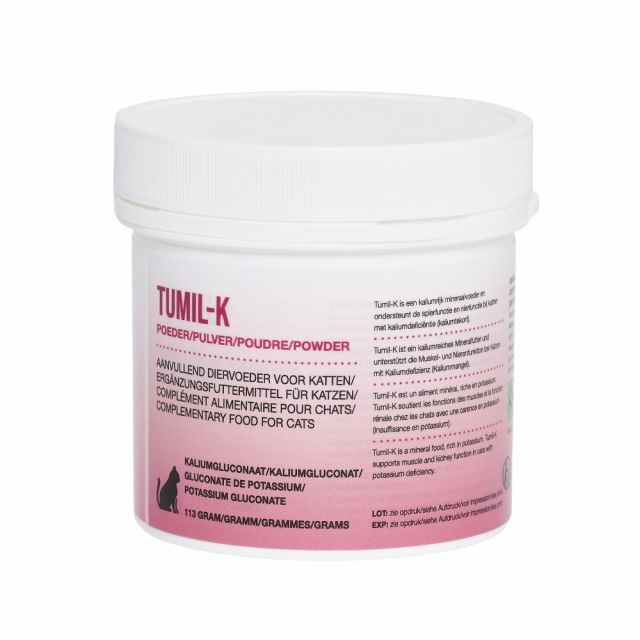Tumil-K
Tumil-K powder is used in cases of potassium deficiency in cats. A potassium deficiency is quite common in cats with chronic kidney disease or in cats that suffer from chronic vomiting. Tumil-K is a complementary feed rich in potassium.
Potassium deficiency in cats
A potassium deficiency is also called hypokalemia. By far the most common cause of potassium deficiency is chronic kidney disease (CKD) in cats. It can also occur in other conditions, such as chronic vomiting or diarrhea, significantly reduced appetite, an overactive thyroid (hyperthyroidism) or adrenal disorders.
In mild to moderate form, a reduced potassium level in the blood usually does not cause clear symptoms. Severe hypokalemia, on the other hand, can lead to life-threatening symptoms.
The most important consequence of a severe potassium deficiency is muscle weakness. Cats may have difficulty standing up or walking and sometimes appear as if they are drunk. A typical sign is that they cannot properly hold up their head: the neck is bent and the head hangs down.
Other possible signs of hypokalemia are:
- Lethargy or depression
- Poor appetite
- Constipation
- A dull, unhealthy-looking coat
Although hypokalemia is often mild and unnoticed, it is important to consider this diagnosis in cases of clear weakness or other complaints. A blood test at the veterinarian can confirm the diagnosis.
Recommended dosage and method of use
Tumil-K is available without prescription, but it is recommended to administer Tumil-K only in consultation with your veterinarian.
The powder of Tumil-K contains a tasty liver flavor, making the product easy to give to your cat. You should mix ¼ teaspoon (0.65 grams) of the powder into your cat’s food twice daily. In consultation with your veterinarian, the dosage can be adjusted if the potassium level in the blood has not sufficiently improved.
Medication and supplements alongside Tumil-K
Tumil-K is often used in cats with chronic kidney disease. In addition to this supplement, other treatments may also be necessary to optimally support your cat.
Kidney diet
The basis of managing CKD is special dietary food, such as Sanimed Renal Cat. This food helps to relieve the kidneys by providing lower phosphate and salt content, adjusted proteins, sufficient energy, and palatability. It also contains anti-inflammatory fatty acids and antioxidants.
Medication
Cats with kidney failure can lose protein through the urine. Semintra 4 mg/ml can help to limit this loss. In addition, high blood pressure is common in kidney patients, for which Semintra 10 mg/ml or Amodip may be used.
If the hypokalemia is related to an overactive thyroid, thyroid medication will be prescribed.
Additional supplements
Alongside Tumil-K, other supplements can also help, such as Ipakitine or Pronefra, which bind excess phosphate and harmful waste products. These can be a valuable addition if phosphate levels remain elevated despite a kidney diet.
If potassium deficiency results in constipation, in addition to correcting the potassium level, water-binding psyllium fibers in Iso-Gel may be recommended in consultation with your veterinarian.
Finally, always provide sufficient drinking water and intervene in time in cases of reduced appetite, thirst, or suspected constipation or muscle weakness. Kidney patients can deteriorate quickly.
If you have a question about Tumil-K or about potassium deficiency in cats, please contact us.

